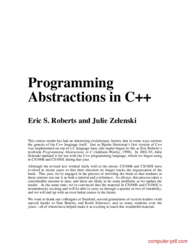Programming Abstractions in C++
The art of programming extends far beyond syntax mastery—it requires developing computational thinking through powerful abstractions that solve complex problems elegantly. Programming Abstractions in C++ offers a rigorous yet accessible journey through fundamental computer science concepts, using C++ as the vehicle to explore recursive algorithms, abstract data types, and efficient data structures. Designed for intermediate programmers, this guide bridges the gap between basic language proficiency and sophisticated problem-solving skills, emphasizing how to think about problems computationally rather than just writing code. The progressive structure—from basic types to graph algorithms—builds a mental framework applicable to everything from coding interviews to large-scale system design.
Learning the Programming Abstractions in C++
Beginning with C++ fundamentals, the book quickly transitions to core abstraction techniques, demonstrating how interfaces and libraries create reusable, maintainable code. The early chapters on abstract data types (ADTs) establish a crucial mindset: separating interface from implementation. Readers learn to design clean APIs for stacks, queues, and collections before seeing their underlying implementations—a pedagogical approach that mirrors professional software engineering practices. The treatment of recursion stands out, progressing from simple factorial examples to sophisticated backtracking algorithms that solve constraint-satisfaction problems. Through puzzles like maze navigation and n-queens, the text reveals recursion's expressive power while cautioning about pitfalls like stack overflows in deep recursion.
A significant portion of the guide focuses on algorithmic efficiency, teaching how to analyze time/space complexity using Big-O notation before implementing solutions. The data structures chapters (linear structures, trees, graphs) don't just present implementations—they explore the engineering tradeoffs between array-based and pointer-based designs, helping readers choose the right abstraction for performance constraints. The expression trees chapter beautifully connects theory to practice, showing how abstract syntax trees underpin everything from calculators to compiler design. Throughout these sections, C++ features like templates and operator overloading are employed judiciously to create intuitive, type-safe interfaces.
The book excels in blending classic computer science with modern C++ practices. The object-oriented programming chapters demonstrate how classes encapsulate complexity without dogmatically insisting on OOP for every problem. Advanced topics like memory efficiency discuss cache-aware data layouts and move semantics, bridging abstract theory with hardware realities. Particularly valuable are the map and set implementations, which compare hash-based versus tree-based approaches while introducing STL-equivalent interfaces. These chapters equip readers to understand—and potentially customize—standard library components rather than treating them as black boxes.
For problem-solvers, the graph algorithms section provides a masterclass in abstraction, reducing diverse problems (network routing, social connections, dependency resolution) to common graph traversals. The text's consistent emphasis on interface design shines here, showing how to build graph libraries flexible enough for various traversal strategies (DFS, BFS, Dijkstra's). This approach reinforces a key insight: good abstractions make complex algorithms accessible, whether the application is route planning or compiler optimization.
More than just a data structures book, this guide cultivates a design-oriented mindset crucial for professional development. The carefully sequenced exercises—from recursive art generation to memory-efficient sparse matrices—challenge readers to apply concepts in creative ways. By the conclusion, programmers will not only understand C++'s abstraction mechanisms but will also think differently about decomposing problems, recognizing patterns, and evaluating solution tradeoffs. These skills transcend any single language, making this resource valuable even as C++ evolves, and forming a foundation for tackling everything from embedded systems to machine learning infrastructure.
| Description : | Download free course Programming Abstractions in C++, PDF ebook on 682 pages by Eric S. Roberts and Julie Zelenski. |
| Level : | Beginners |
| Created : | December 24, 2018 |
| Size : | 4.03 MB |
| File type : | |
| Pages : | 682 |
| Author : | Eric S. Roberts and Julie Zelenski |
| Downloads : | 3130 |
Online Tutorials
